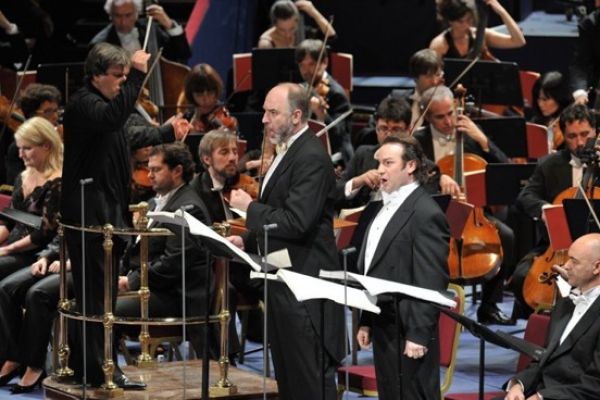Rossini's William Tell has to be the most well-known unknown opera ever written. There's unlikely to be a man, woman or dog on the planet who can't whistle or bark a part of the overture. But the other four hours? What of that? One opera aficionado told me that the last time he'd heard the whole thing live, Winston Churchill was still in Number 10. Prommers were being given their first chance last night. It was hard not to come to it with trepidation. Because operas are like people; they aren't usually left on the shelf for this long for no reason.
Of course, there is a reason. A simple story of forbidden love and a downtrodden people (think Aida with cowbells) is drawn out in a way that almost defies belief.
Four acts, 33 scenes, and more Swiss history than you ever needed (or wanted) to know makes it very likely that William Tell will forever be barred from the core repertoire. But much of the music, particularly in the first act - particularly when it's performed with as much flair as the Orchestra of the Academy of Santa Cecilia, Rome offered last night under the inexhaustible watch of Antonio Pappano - is undeniably ravishing.
Here was a Rossini few of us will have yet encountered in his operas, one whose emotional range, sense of orchestral experimentation and harmonic exploration seem to find their full maturity. Melodic invention bursts from the seams as usual. But so does rhythmic interest and structural niftiness. The recitative is woven together as if with a thread made of lightning, wriggling orchestral palpitations shooting through the stichomythia. Elsewhere, the meeting of the tender and the pastoral is quite unique. The sun-flushed first act benediction on the marriage celebrations lands on us like the sweetest of dawn kisses.

The orchestra were on cracking form, and knew it. There was an Italian sprezzatura to the sectional confidence; cellos, violins, woodwind, brass, all dealing with their individual hurdles as if they were showing off on the beach. There was a similar confidence (if not as much consistent success) in the singing. John Osborn (pictured right, on the right. Photo: BBC/Chris Christodoulou) rightly brought the house down for hitting his 28 high Cs and two high C-sharps in the final act cabaletta. And his piercing voice, which seemed to part the oceanic space before him very effectively, delivered much by way of a dashing heroism in the first act. But his moments of introspection hit the target far less.
His partner in the second act love duet was Malin Byström's Mathilde, whose buttery voice had a tendency to melt away just as you were beginning to believe in it. The lovebirds had plenty of energy but not enough charm or elegance or rapport at this key moment, which left the second act slightly deflated. Michele Pertusi's William Tell (pictured right, on the left. Photo: BBC/Chris Christodoulou) was nicely moody. Elena Xanthoudakis's small but brightly voiced turn as Tell's nearly sacrificed son, Jemmy, was a ray of very welcome vocal sun. And the chorus, though woolly, had a charm to them, particularly when the women delivered their breezy Tyrolienne sotto voce.
It was Pappano's night, however. He propelled the work and navigated the changes of mood quite brilliantly. One gripe: I wish there'd been surtitles (looking up and down during the endless back and forth wasn't fun). And I wish Rossini hadn't plastered most of the final 20 minutes with bass drum and cymbal. But just as I was beginning to think seriously about switching allegiances to the Habsburg overlords, hoping they'd put an end to all the tiresome Swiss small talk, Rossini unveils a shimmering final musical prospect almost as splendid as that of Loge's rainbow bridge in Das Rheingold. Certainly, in spite of the flaws, I'd say that the work is long overdue a staging in the UK. And the word on the street is that we won't have to wait long before a new production comes to Covent Garden.















Add comment